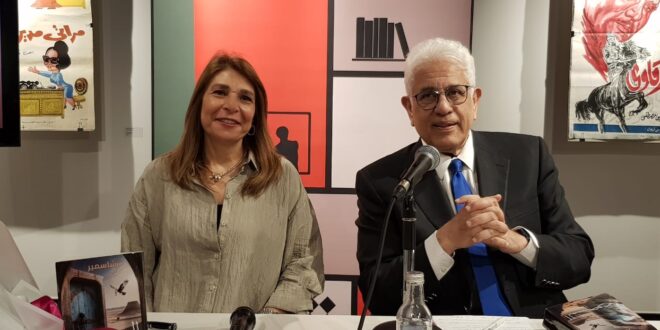Today, Tuesday, July 2, 2024, Dr. Hossam Badrawy, author, Dr. Hossam Badrawy, discussed in the Biblotic Library. Rasha Samir’s latest publication is the novel “The Enchanted”, where Dr. Badrawi expressed his great admiration for the novel, describing Dr. Rasha Samir as having reached an unprecedented level in writing the novel, as the amount of intertwining in the fabric of the novel is great, and in it the writer combined the Amazigh heritage, the geography of the desert, myths with stories, in addition to information and knowledge. Within a multi-character narrative frame woven by the writer’s imagination.
The sequence of events made her novel an exception among the conventional Egyptian novels.
Dr. Badrawi then reviewed some of the points that stopped him while reading the novel, the information that was added to it, and some of the vocabulary that the writer used, which he described as new to him. Then, Dr. Rasha Samir reviewed her journey towards writing her novel, which took nearly four years to write, and her experience in the city. Siwa and the events she went through, but she did not want to expose the events of the novel for fear that it would extinguish the curiosity of the attendees who had not read the novel yet. The symposium was more than wonderful, followed by a signing ceremony for the novel in a beautiful and enjoyable atmosphere.
It is a joyful welcome to a writer who has risen to literary and artistic maturity that deserves praise in her artistic career.
The sequence of events made her novel an exception among the conventional Egyptian novels.
Dr. Badrawi then reviewed some of the points that stopped him while reading the novel, the information that was added to it, and some of the vocabulary that the writer used, which he described as new to him. Then, Dr. Rasha Samir reviewed her journey towards writing her novel, which took nearly four years to write, and her experience in the city. Siwa and the events she went through, but she did not want to expose the events of the novel for fear that it would extinguish the curiosity of the attendees who had not read the novel yet. The symposium was more than wonderful, followed by a signing ceremony for the novel in a beautiful and enjoyable atmosphere.
It is a joyful welcome to a writer who has risen to literary and artistic maturity that deserves praise in her artistic career.
 Dr. Hossam Badrawi Official Website
Dr. Hossam Badrawi Official Website


